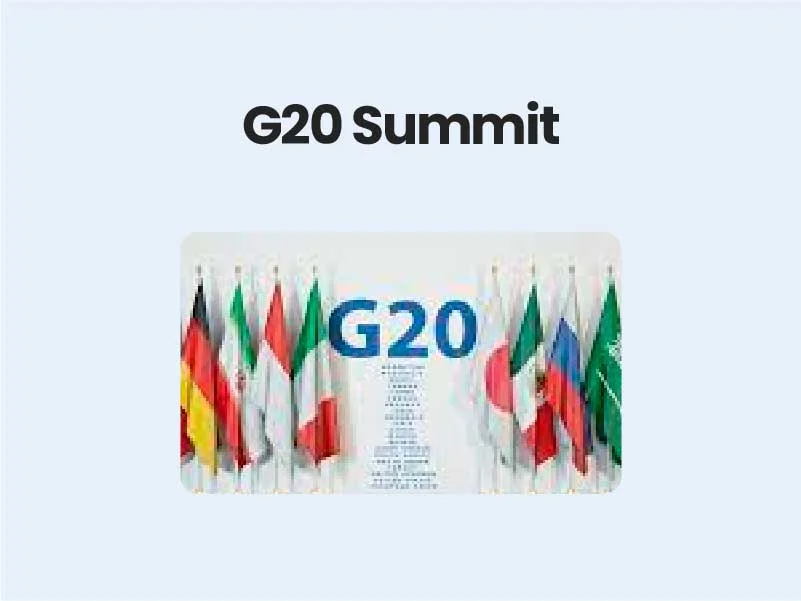
G20 Summit
The G20 is the premier forum for international economic cooperation. It gathers the leaders of the largest economies of the world to discuss financial and socioeconomic issues.
- The Group of Twenty, or the G20, is the premier forum for international economic cooperation. The G20 brings together the leaders of both developed and developing countries from every continent.
- Collectively, G20 members represent around 80% of the world’s economic output, two-thirds of the global population and three-quarters of international trade. Throughout the year, representatives from G20 countries gather to discuss financial and socioeconomic issues.
How does the G20 Work?
- The presidency of the G20 rotates between member countries every year. The presidency plays a leading role in setting the agenda and organizing the Leaders’ Summit, which is attended by the G20 Heads of State or Government. At the Summit, the leaders issued a declaration, or communiqué, based on policy discussions at meetings held throughout the year.
- In the run-up to the Summit, the presidency hosts several meetings featuring Ministers, senior government officials as well as civil society representatives.
- At the government level, the G20 work is organized around the Finance and Sherpa Tracks, while civil society assembles through Engagement Groups.
The Finance Track:
- Meetings of G20 Finance Ministers and Central Bank Governors, as well as their Deputies, focus on fiscal and monetary policy issues such as the global economy, infrastructure, financial regulation, financial inclusion, international financial architecture, and international taxation.
The Sherpa Track:
- Meetings of Ministers and relevant senior officials, which focus on socioeconomic issues such as agriculture, anti-corruption, climate, digital economy, education, employment, energy, environment, health, tourism, trade, and investment.
Engagement Groups:
- Represent civil society and develop recommendations that are submitted to G20 Leaders for their consideration. Engagement Groups include the Business 20, Youth 20, Labour 20, Think 20, Civil 20, Women 20, Science 20, and Urban 20.
Read Also Digital Services Tax
G20 Participants
The G20 members are Argentina, Australia, Brazil, Canada, China, France, Germany, India, Indonesia, Italy, Japan, Mexico, Republic of Korea, Russia, Saudi Arabia, South Africa, Turkey, the United Kingdom, the United States and the European Union (EU).
International Organizations:
- The Food and Agriculture Organization (FAO), the Financial Stability Board (FSB), the International Labour Organization (ILO), the International Monetary Fund (IMF), the Organization for Economic Cooperation and Development (OECD), the United Nations (UN), the World Bank Group (WBG), the World Health Organization (WHO) and the World Trade Organization (WTO).
India’s Priorities in G20 Summits
- Checking tax evasion to fight corruption
- Choking terror funds
- Cutting the cost of remittances
- Market access for key drugs
- Reforms in the World Trade Organisation to improve its functioning
- “Full implementation” of the Paris Agreement
- India and the US discussed various bilateral and global issues including Iran, 5G communications networks, trade and defence ahead of the G-20 Summit.
- India targeted to become a five-trillion dollar economy in the next five years.
Read India Sri Lanka Relations
Challenges:
- Tackling ocean plastic waste
- To make development sustainable and all-inclusive.
- Instability and downfall in the global economy. Unilateralism and competitiveness are overshadowing the rule-based multilateral global trade systems.
- Terrorism is a major challenge.
Way Forward
- Need for a more coordinated effort
- Need to redefine conversations on globalization.
- Life-cycle approach
o.
Enroll today with the best civils service academy and take your first step towards your Civils journey.
Feel free to reach out to us for any inquiries, collaborations, or support. We’re here to help.

